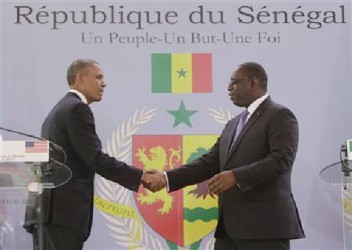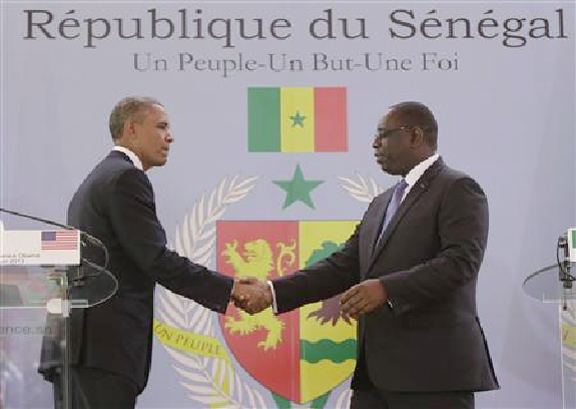GOREE ISLAND, Senegal, (Reuters) – Almost four centuries after Africans started being shipped to North America as slaves, the first U.S. president of African ancestry yesterday visited an infamous embarkation point for those destined for lives in chains.
In his first – and, many Africans say, long-overdue – extended tour of the continent since entering the White House, President Barack Obama focused on political and economic issues while also recalling a painful chapter in Africa’s and America’s past.
On the first leg of an eight-day visit he brought his family to the House of Slaves, a fort built in the late 18th century on Goree Island off the coast of Senegal as a transit point for human beings before they were shipped across the Atlantic. It is now a museum.
“It’s a very powerful moment…to be able to come here and to fully appreciate the magnitude of the slave trade, to get a sense in a very intimate way of the incredible inhumanity and hardship that people faced,” Obama said in brief remarks.
“More than anything what it reminds us of is that we have to remain vigilant when it comes to the defense of people’s human rights.”

Obama’s father was from Kenya and his mother was from Kansas. First lady Michelle Obama is a descendant of slaves.
Junius Rodriguez, a historian at Eureka College near Peoria, Illinois, said Obama’s visit was a reminder of the “remarkable transformation” the United States had undergone.
“We have moved from a society in which African Americans were not viewed as citizens, in which social, economic equality was not provided, to one in which we could elect an African American president,” he said before the visit.
Many Africans feel a bond with Obama but have voiced disappointment that he has not engaged with the continent as much as previous presidents George W. Bush and Bill Clinton.
During his first term, Obama’s only African trip was a one-day stopover in Ghana, and many Africans have been impatient for him to make an extended tour.
“It’s a real pleasure for us that the world has advanced enough for a black man to be president of the United States,” said Abdoul Aziz Signane, a tailor, purchasing an Obama T-shirt at a shop in the Senegalese capital Dakar.
“It makes us very proud. That’s why I came to buy a T-shirt so I can welcome him and tell him ‘We love you Obama, a lot.’”
Obama toured tiny cells that once housed men, women, and children before they were taken in chains through the House of Slaves’ infamous “door of no return” to waiting ships.
Eloi Coly, curator of the House of Slaves, welcomed Obama’s visit. “It’s … an occasion to put the slave house on the map of the world,” he said.
APOLOGY UNLIKELY
Earlier yesterday, Obama held talks with Senegalese President Macky Sall and met with lawyers and judges at the Supreme Court, kicking off his tour with praise for Africa’s democratic progress and a pledge to promote trade.

